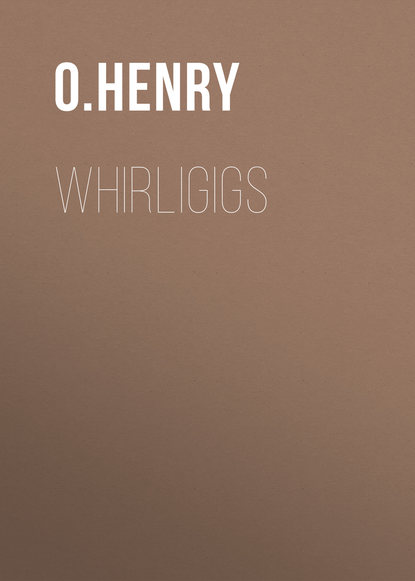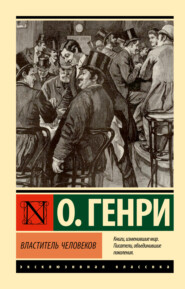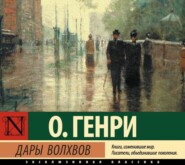По всем вопросам обращайтесь на: info@litportal.ru
(©) 2003-2025.
✖
Whirligigs
Настройки чтения
Размер шрифта
Высота строк
Поля
Mlle. Giraud's eyes were shining with a joy that could not have existed under the chaperonage of the mountain-tops. There were other spirits calling to her – nymphs of the orange groves, pixies from the chattering surf, imps, born of the music, the perfumes, colours and the insinuating presence of humanity. She laughed aloud, musically, at a sudden thought.
"Won't there be a sensation?" she called to Armstrong. "Don't I wish I had an engagement just now, though! What a picnic the press agent would have! 'Held a prisoner by a band of savage Indians subdued by the spell of her wonderful voice' – wouldn't that make great stuff? But I guess I quit the game winner, anyhow – there ought to be a couple of thousand dollars in that sack of gold dust I collected as encores, don't you think?"
He left her at the door of the little Hotel de Buen Descansar, where she had stopped before. Two hours later he returned to the hotel. He glanced in at the open door of the little combined reception room and cafe.
Half a dozen of Macuto's representative social and official caballeros were distributed about the room. Señor Villablanca, the wealthy rubber concessionist, reposed his fat figure on two chairs, with an emollient smile beaming upon his chocolate-coloured face. Guilbert, the French mining engineer, leered through his polished nose-glasses. Colonel Mendez, of the regular army, in gold-laced uniform and fatuous grin, was busily extracting corks from champagne bottles. Other patterns of Macutian gallantry and fashion pranced and posed. The air was hazy with cigarette smoke. Wine dripped upon the floor.
Perched upon a table in the centre of the room in an attitude of easy preëminence was Mlle. Giraud. A chic costume of white lawn and cherry ribbons supplanted her travelling garb. There was a suggestion of lace, and a frill or two, with a discreet, small implication of hand-embroidered pink hosiery. Upon her lap rested a guitar. In her face was the light of resurrection, the peace of elysium attained through fire and suffering. She was singing to a lively accompaniment a little song:
"When you see de big round moon
Comin' up like a balloon,
Dis nigger skips fur to kiss de lips
Ob his stylish, black-faced coon."
The singer caught sight of Armstrong.
"Hi! there, Johnny," she called; "I've been expecting you for an hour. What kept you? Gee! but these smoked guys are the slowest you ever saw. They ain't on, at all. Come along in, and I'll make this coffee-coloured old sport with the gold epaulettes open one for you right off the ice."
"Thank you," said Armstrong; "not just now, I believe. I've several things to attend to."
He walked out and down the street, and met Rucker coming up from the Consulate.
"Play you a game of billiards," said Armstrong. "I want something to take the taste of the sea level out of my mouth."
VI
"GIRL"
In gilt letters on the ground glass of the door of room No. 962 were the words: "Robbins & Hartley, Brokers." The clerks had gone. It was past five, and with the solid tramp of a drove of prize Percherons, scrub-women were invading the cloud-capped twenty-story office building. A puff of red-hot air flavoured with lemon peelings, soft-coal smoke and train oil came in through the half-open windows.
Robbins, fifty, something of an overweight beau, and addicted to first nights and hotel palm-rooms, pretended to be envious of his partner's commuter's joys.
"Going to be something doing in the humidity line to-night," he said. "You out-of-town chaps will be the people, with your katydids and moonlight and long drinks and things out on the front porch."
Hartley, twenty-nine, serious, thin, good-looking, nervous, sighed and frowned a little.
"Yes," said he, "we always have cool nights in Floralhurst, especially in the winter."
A man with an air of mystery came in the door and went up to Hartley.
"I've found where she lives," he announced in the portentous half-whisper that makes the detective at work a marked being to his fellow men.
Hartley scowled him into a state of dramatic silence and quietude. But by that time Robbins had got his cane and set his tie pin to his liking, and with a debonair nod went out to his metropolitan amusements.
"Here is the address," said the detective in a natural tone, being deprived of an audience to foil.
Hartley took the leaf torn out of the sleuth's dingy memorandum book. On it were pencilled the words "Vivienne Arlington, No. 341 East –th Street, care of Mrs. McComus."
"Moved there a week ago," said the detective. "Now, if you want any shadowing done, Mr. Hartley, I can do you as fine a job in that line as anybody in the city. It will be only $7 a day and expenses. Can send in a daily typewritten report, covering – "
"You needn't go on," interrupted the broker. "It isn't a case of that kind. I merely wanted the address. How much shall I pay you?"
"One day's work," said the sleuth. "A tenner will cover it."
Hartley paid the man and dismissed him. Then he left the office and boarded a Broadway car. At the first large crosstown artery of travel he took an eastbound car that deposited him in a decaying avenue, whose ancient structures once sheltered the pride and glory of the town.
Walking a few squares, he came to the building that he sought. It was a new flathouse, bearing carved upon its cheap stone portal its sonorous name, "The Vallambrosa." Fire-escapes zigzagged down its front – these laden with household goods, drying clothes, and squalling children evicted by the midsummer heat. Here and there a pale rubber plant peeped from the miscellaneous mass, as if wondering to what kingdom it belonged – vegetable, animal or artificial.
Hartley pressed the "McComus" button. The door latch clicked spasmodically – now hospitably, now doubtfully, as though in anxiety whether it might be admitting friends or duns. Hartley entered and began to climb the stairs after the manner of those who seek their friends in city flat-houses – which is the manner of a boy who climbs an apple-tree, stopping when he comes upon what he wants.
On the fourth floor he saw Vivienne standing in an open door. She invited him inside, with a nod and a bright, genuine smile. She placed a chair for him near a window, and poised herself gracefully upon the edge of one of those Jekyll-and-Hyde pieces of furniture that are masked and mysteriously hooded, unguessable bulks by day and inquisitorial racks of torture by night.
Hartley cast a quick, critical, appreciative glance at her before speaking, and told himself that his taste in choosing had been flawless.
Vivienne was about twenty-one. She was of the purest Saxon type. Her hair was a ruddy golden, each filament of the neatly gathered mass shining with its own lustre and delicate graduation of colour. In perfect harmony were her ivory-clear complexion and deep sea-blue eyes that looked upon the world with the ingenuous calmness of a mermaid or the pixie of an undiscovered mountain stream. Her frame was strong and yet possessed the grace of absolute naturalness. And yet with all her Northern clearness and frankness of line and colouring, there seemed to be something of the tropics in her – something of languor in the droop of her pose, of love of ease in her ingenious complacency of satisfaction and comfort in the mere act of breathing – something that seemed to claim for her a right as a perfect work of nature to exist and be admired equally with a rare flower or some beautiful, milk-white dove among its sober-hued companions.
She was dressed in a white waist and dark skirt – that discreet masquerade of goose-girl and duchess.
"Vivienne," said Hartley, looking at her pleadingly, "you did not answer my last letter. It was only by nearly a week's search that I found where you had moved to. Why have you kept me in suspense when you knew how anxiously I was waiting to see you and hear from you?"
The girl looked out the window dreamily.
"Mr. Hartley," she said hesitatingly, "I hardly know what to say to you. I realize all the advantages of your offer, and sometimes I feel sure that I could be contented with you. But, again, I am doubtful. I was born a city girl, and I am afraid to bind myself to a quiet suburban life."
"My dear girl," said Hartley, ardently, "have I not told you that you shall have everything that your heart can desire that is in my power to give you? You shall come to the city for the theatres, for shopping and to visit your friends as often as you care to. You can trust me, can you not?"
"To the fullest," she said, turning her frank eyes upon him with a smile. "I know you are the kindest of men, and that the girl you get will be a lucky one. I learned all about you when I was at the Montgomerys'."
"Ah!" exclaimed Hartley, with a tender, reminiscent light in his eye; "I remember well the evening I first saw you at the Montgomerys'. Mrs. Montgomery was sounding your praises to me all the evening. And she hardly did you justice. I shall never forget that supper. Come, Vivienne, promise me. I want you. You'll never regret coming with me. No one else will ever give you as pleasant a home."
The girl sighed and looked down at her folded hands.
A sudden jealous suspicion seized Hartley.
"Tell me, Vivienne," he asked, regarding her keenly, "is there another – is there some one else ?"
A rosy flush crept slowly over her fair cheeks and neck.
"You shouldn't ask that, Mr. Hartley," she said, in some confusion. "But I will tell you. There is one other – but he has no right – I have promised him nothing."
"His name?" demanded Hartley, sternly.
"Townsend."
"Rafford Townsend!" exclaimed Hartley, with a grim tightening of his jaw. "How did that man come to know you? After all I've done for him – "
"His auto has just stopped below," said Vivienne, bending over the window-sill. "He's coming for his answer. Oh I don't know what to do!"

















